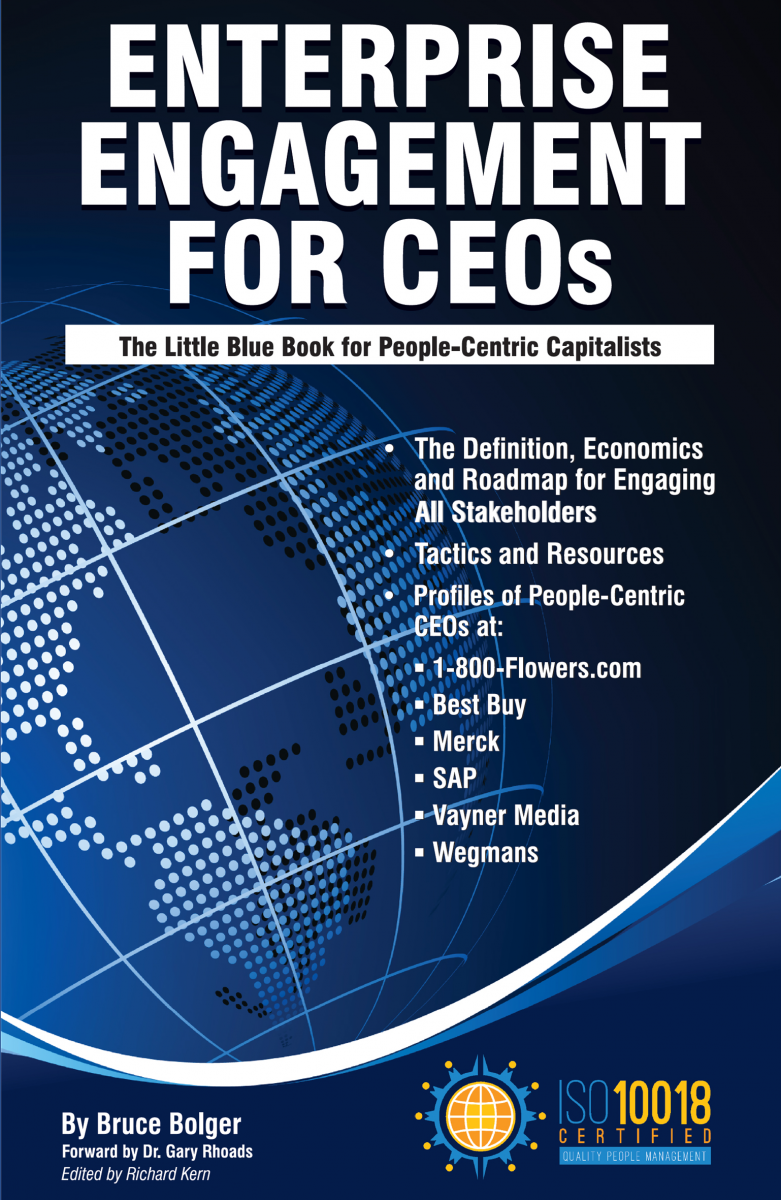Analysis: Stakeholder Capitalism Makes More News
 In a New York Times article published in its Sunday Business section, John Mackey of Whole Foods Market, says, "When businesses find their true purpose and serve not just investors but all stakeholders, everyone wins." He adds, "Whole Foods can't solve all the country's problems...What we can do...is sell healthy food to people. We have 100,000 people working with the company. So, we've been a good employer. We've tried to keep them safe during Covid-19 times."
In a New York Times article published in its Sunday Business section, John Mackey of Whole Foods Market, says, "When businesses find their true purpose and serve not just investors but all stakeholders, everyone wins." He adds, "Whole Foods can't solve all the country's problems...What we can do...is sell healthy food to people. We have 100,000 people working with the company. So, we've been a good employer. We've tried to keep them safe during Covid-19 times." Also last week, the World Economic Forum doubled down on its commitment to promoting Stakeholder Capitalism in a report overseen by Brian Moynihan, Bank of America CEO and Klaus Schwab of the WEF, "Measuring Stakeholder Capitalism: Towards Common Metrics and Consistent Reporting of Sustainable Value Creation." The report recommends an ambitious set of ESG disclosure principles, including human capital measures related to diversity, pay equity, health and safety, training, employee turnover, and oversight of supply chain people practices.
Also last week, the World Economic Forum doubled down on its commitment to promoting Stakeholder Capitalism in a report overseen by Brian Moynihan, Bank of America CEO and Klaus Schwab of the WEF, "Measuring Stakeholder Capitalism: Towards Common Metrics and Consistent Reporting of Sustainable Value Creation." The report recommends an ambitious set of ESG disclosure principles, including human capital measures related to diversity, pay equity, health and safety, training, employee turnover, and oversight of supply chain people practices. Pointing out the 2021 proxy season is near, Michael S. Melbinger, an attorney at Winston & Strawn LLP tells clients in the company’s blog some of the human capital issues they need to consider in light of the new Securities & Exchange Commission disclosure requirements:
Pointing out the 2021 proxy season is near, Michael S. Melbinger, an attorney at Winston & Strawn LLP tells clients in the company’s blog some of the human capital issues they need to consider in light of the new Securities & Exchange Commission disclosure requirements:- The organizational structure through which the company manages its human capital resources.
- Internal rates of hiring and promotion.
- Measures regarding average hours of training per employee per year.
- Measures regarding worker productivity.
- The education and experience of the company’s workforce.
- Succession planning for potential successors to senior leadership roles.
- Opportunities for emerging talent in the organization.
- The safety of the workforce, including frequency, severity and lost-time due to injuries, illnesses and fatalities, and percent of first-tier suppliers that were audited for safety and health compliance.
- Inculcating company culture and norms.
- Information regarding the trend of all/each of the human capital factors above."
Master the Principles of Stakeholder Capitalism And Implementation Through Enterprise Engagement

This is the definitive implementation guide to Stakeholder Capitalism, written specifically to provide CEOs and their leadership teams a concise overview of the framework, economics, and implementation process of a CEO-led strategic and systematic approach to achieving success through people. (123 pages, $15.99)

The first and most comprehensive book on Enterprise Engagement and the new ISO 9001 and ISO 10018 quality people management standards. Includes 36 chapters detailing how to better integrate and align engagement efforts across the enterprise. (312 pages, $36.)
OTHER RESOURCES TO ACTUALIZE STAKEHOLDER CAPITALISM
Communities: The Enterprise Engagement Alliance and Advocate and the Brand Media Coalition free resource centers offering access to the latest research, news, and case studies; discounts, promotions, referrals, and commissions, when appropriate to third-party solution providers from participating coalition solution provider members.
Online Overview:
10-minute short course: click here for a 10-minute introduction to Enterprise Engagement and ISO standards from the Coggno.com learning platform.
Services:
• The Engagement Agency at EngagementAgency.net, offering: complete support services for employers, solution providers, and technology firms seeking to profit from formal engagement practices for themselves or their clients, including Brand and Capability audits for solution providers to make sure their products and services are up to date.
• C-Suite Advisory Service—Education of boards, investors, and C-suite executives on the economics, framework, and implementation processes of Enterprise Engagement.
• Speakers Bureau—Select the right speaker on any aspect of engagement for your next event.
• Mergers and Acquisitions. The Engagement Agency’s Mergers and Acquisition group is aware of multiple companies seeking to purchase firms in the engagement field. Contact Michael Mazer in confidence if your company is potentially for sale at 303-320-3777.
Enterprise Engagement Benchmark Tools: The Enterprise Engagement Alliance offers three tools to help organizations profit from Engagement. Click here to access the tools.
• ROI of Engagement Calculator. Use this tool to determine the potential return-on-investment of an engagement strategy.
• EE Benchmark Indicator. Confidentially benchmark your organization’s Enterprise Engagement practices against organizations and best practices.
• Compare Your Company’s Level of Engagement. Quickly compare your organization’s level of engagement to those of others based on the same criteria as the EEA’s Engaged Company Stock Index.
• Gauge Your Personal Level of Engagement. This survey, donated by Horsepower, enables individuals to gauge their own personal levels of engagement.
For more information, contact Bruce Bolger at Bolger@TheEEA.org, 914-591-7600, ext. 230.














